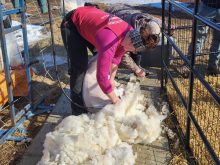A call from U.S. cattle groups for a retaliatory duty against Canadian cattle comes as no surprise to producers in Canada.
The objective of groups like the
U.S. National Farmers’ Union and its ally, R-CALF, is to halt trade through litigation or other means, said John Masswohl of the Canadian Cattlemen’s
Association.
“We knew they would switch tactics,” he said from Denver, Colo., where Canadian beef producers attended the U.S. National Cattlemen’s Beef Association summer meeting.
A preliminary injunction to keep the border closed to Canadian cattle was lost on appeal and trade resumed July 18 after more than two years of embargo.
Read Also

Charges laid after cattle theft
Saskatchewan RCMP lay two charges against a man after six cattle went missing.
The U.S. farmers’ union, which is not affiliated with the Canadian National Farmers Union, is complaining Canadian cattle entering the U.S. are subsidized through the BSE recovery programs offered through the federal and provincial governments.
“U.S. cattle producers have experienced a drop in prices since the reopening of the border,” said the union in a statement.
It claims Canadian cattle are subsidized by $200 per head and place American producers at an unfair advantage. The payments it refers to are the calf and fed cattle set-aside programs that were suspended when the border opened July 18.
In total, Canadian governments paid out about $2 billion to cover losses estimated between $6-$8 billion, said Masswohl.
In Alberta, for example, where more than half of the Canadian herd lives, the province reports $632 million in direct funding that excludes income stabilization payments paid to producers in the last two fiscal years.
“We only received a fraction of what was lost,” Masswohl said.
When the programs were designed, livestock groups specified they must abide by world trade and North American free trade agreement rules.
“All governments have the right to support their producers in time of disaster,” he said.
The farmers’ union has asked the U.S. Department of Agriculture to request Canada stop sending subsidized cattle to their market.
It also wants the USDA to investigate whether the BSE aid programs violated international agreements and if Canada persists in subsidizing its cattle industry, that a countervailing duty investigation be launched immediately with import tariffs to protect American producers.
The farmers’ union, based in Washington, did not return calls for further comment.
An analysis from the University of Missouri said the open border had little impact on the U.S. cattle futures market. While live prices were down $1.12 US per hundredweight for fed cattle, this had more to do with U.S. demand than the small numbers of Canadian fat steers appearing south of the border.
For the last two weeks, fewer than 10,000 Canadian market ready and feeder animals have been cleared for export to the U.S. For the week of July 25-29, U.S. packers killed 644,000 head. Canfax reported Alberta fed cattle prices dipped slightly in the last two weeks.
This is due to a rise in the Canadian dollar to 82 cents US making imports more expensive, higher freight rates and the added export verification cost.
On July 29, the TEAM electronic auction sold about 2,200 head of cattle ranging in weight from 600-1,100 pounds, with prices remaining steady since increasing two weeks ago when the border opened, said Don Danard of the Calgary Public Stockyards.
This sale included an order for 250 heifers weighing 650 lb. each for delivery to the U.S. the first week of August.
“Some U.S. interest added a better feeling to the market,” Danard said.
While American interest was welcomed to increase morale and market competition, the added requirements of checking animals for age, pregnancy and branding raises costs for buyers and sellers, he said.

















